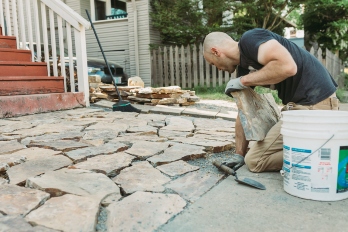Heat pump
Heat pumps collect heat from one location and move it to another. They do so by using refrigerant, compressors, coils, and fans. They have two units connected by copper lines — one goes outside and the other goes inside. Fans blow heat off the coils and move it through ductwork to different parts of your home.
- Efficiency: 100%
- Lifespan: 14-16 years
- Replacement cost: $4,500-$8,000
Types of fuel
Your system needs to burn some kind of fuel to create heat. While heat pumps are always powered by electricity, furnaces and boilers can run on natural gas (like methane or ethane), propane, heating oil, or electricity.
Nearly half of the homes in the United States use natural gas as their primary heating fuel. Electricity accounts for about 35% and the remaining use propane, heating oil, or wood.
Cost, efficiency, and availability are a few things to consider when comparing different types of fuels.
Electricity
Heating units that run on electricity are expensive to operate. Apples to apples, electricity is typically more expensive than gas or oil. However, because of electricity is so readily available, the up-front costs of installing a unit that runs on electricity may be lower compared to other systems. Electric units also tend to require less maintenance than gas or oil.
Natural gas
Natural gas is less efficient than electricity and propane, and more efficient than heating oil. Burning it create fumes that must be vented out of your home. To use natural gas, your home needs to be connected to a municipal gas line. And if your home isn’t already set up to run gas appliances, the upfront costs could be much higher. The risks of fire and carbon monoxide also cause gas-burning units to require more maintenance.
Propane
While propane is a more expensive fuel than natural gas and heating oil, it burns more efficiently. This makes it more affordable than natural gas in the long run, though the costs of getting propane delivered to your home can add up. Installing a propane system can also be expensive up front as it often requires plumbing work, ventilation, and a tank to hold your propane. The risks of fire and carbon monoxide also cause propane units to require more maintenance.
Heating oil
Heating oil costs less than electricity, though it’s generally slightly more expensive and less efficient than gas or propane. Like propane, units that burn heating oil can be expensive to install due to the need for plumbing, ventilation, and a storage tank. Delivery costs also add up. Though heating oil is less of a fire risk than propane and natural gas, it doesn’t burn as clean as gases, so equipment often requires more maintenance.
Thinking about a new heating system?
If you’re in the market for a new heating system, your budget, your current heat source, and your heating needs are all important things to consider.
For example, what kind of heating system does your home already have? Do you already have an oil or propane tank? Do you have access to municipal gas lines? Does your home have existing ductwork?
Weighing these factors can help you make the right choice for your home.
Your budget
When considering your budget, think about the up-front costs of buying the unit and the long-term fuel and maintenance costs. It may make sense to pay more for an installation to avoid high utility and maintenance costs later. On the other hand, a more affordable unit may get the job done. Thinking in the short and long term will help you make the best choice.
Your heating needs
Your climate and personal preferences for comfort also matter when picking out a unit.
For example, if you live in a warm region and only need heat for a few weeks per year, it may make more sense to install an electric heater, even though electricity tends to be a more expensive fuel.
However, if you use heat for six months out of the year, it may be better to switch to a more affordable fuel. Be honest with yourself about your needs before committing to a particular system.
Feeling a bit more confident?
Let’s face it, you may never be besties with your furnace or boiler. But now you can identify the different kinds of systems and the fuels they burn. And when it’s time to get a new one, you know what to think about before making the purchase.
For more deep dives into the inner workings of your home, check out these posts:




